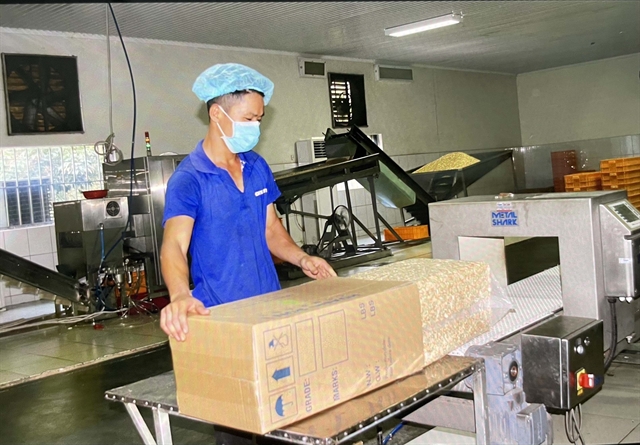 Economy
Economy


|
| Packaging export cashews. Việt Nam's cashew export set a record in the first 11 months with 669,000 tonnes, worth $3.98 billion. — VNA/VNS Photo |
HÀ NỘI — Việt Nam's cashew industry still has to import huge volumes of raw cashew nuts for processing export products, although the sector gained high export value in the first 11 months of this year.
Along with coffee, vegetables and rice, there was a record in cashew exports in the first 11 months, 669,000 tonnes, worth a total of $3.98 billion. Exports were up 15.2 per cent in volume and 20.6 per cent in value over the same period last year, according to General Statistics Office (GSO).
Việt Nam mainly exports cashew nuts of W320, W240, W180, accounting for 63.5 per cent of the total volume and 70 per cent of the total value.
In recent years, Việt Nam's cashew nut export turnover has maintained its leading position in the world, with an average value of about $3-4 billion each year.
However, Việt Nam's cashew industry still faces challenges, with fierce competition with other countries and regions, such as Cambodia and some African countries.
The industry had to spend more than $3 billion importing raw cashew nuts for processing products for exports in the first 11 months. To get that export revenue of $3.98 billion, it was dependent on nut imports, so the trade surplus was only $980 million over the period.
Cashew factories need about 3-3.5 million tonnes of raw cashews each year for export processing, while, the domestic raw cashew output is only about 300,000-350,000 tonnes, or only about ten per cent of the demand.
The shortage of local raw materials is not a new story for the cashew industry. In 2023, the industry achieved a total export value at $3.64 billion, and spent $3.19 billion on imports of nuts, so the industry's trade surplus last year was only $450 million.
This year, the export value is expected to reach $4.3 billion, while the material import value is likely to reach $3.2 billion.
This is a major challenge for the cashew industry. Since the beginning of the year, the price of imported raw cashews has increased, causing the production costs of many cashew businesses to increase by about 20 per cent.
In addition, Decree 15, issued in 2018, includes Article 14 which requires plant-based food imports to originate from countries or territories that have a food safety control system meeting Việt Nam’s standards and the countries have to have approval for exporting to it.
But many African countries, which supply 80 per cent of Việt Nam’s raw cashews, are not included in the list.
This means all cashews imported from Africa can only be used for export and not sold in the domestic market for any reason.
The Việt Nam Cashew Association has proposed that the State consider removing the problem to prevent the risk of inventory, which can cause bankruptcy and losses.
The income of cashew growers is currently only about VNĐ40 million per hectare, which has been almost static over the past decade. By comparison, the income of pepper growers can be up to VNĐ500 million - VNĐ600 million per ha.
Việt Nam's cashew companies need to promote deep processing to gradually increase their exports in the world cashew value chain.
Along with that, the industry needs to see an expansion in growing areas, because it will not develop sustainably without a stable supply of raw cashews. — VNS




